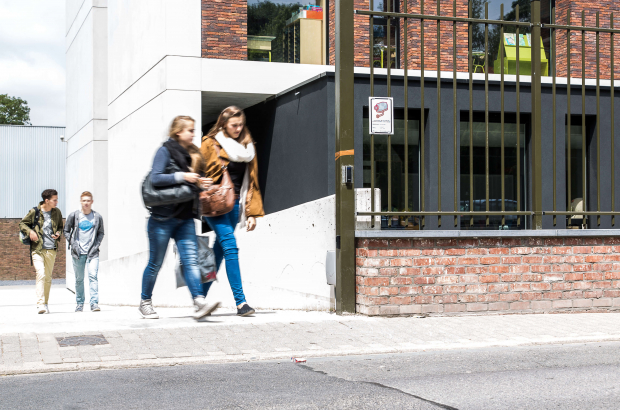- Daily & Weekly newsletters
- Buy & download The Bulletin
- Comment on our articles
Universities ask new governments for multi-lingual education
Elections are coming up at the end of the month, and Brussels’ Dutch- and French-speaking universities, VUB and ULB, have drafted their priorities in a common memorandum. They devoted particular attention to the boosting of publicly funded multi-lingual education in the capital.
When registering their children at school, Brussels’ many expats face a tough choice. In the public system, they have to choose between the Dutch- or French-speaking school network. If they want English, the only options are private European and international schools, with fees that can reach more than €25,000 a year.
“Brussels is the second-most diverse city in the world, but its public education is not adapted to this cosmopolitan context,” says Jan Danckaert, VUB’s vice-rector for education and student affairs. “We are not asking to replace the current school networks, but to create an additional multi-lingual network here.”
The creation of such a network is not yet legally possible in Belgium because of language laws and funding regulations. The universities want the new federal and regional governments to eliminate these obstructions.
Treading carefully
A few political parties in Brussels have already expressed their support. A study by the universities’ Brussels Studies Institute demonstrated several legal solutions, but was limited to bilingual schools where French and Dutch would be used on an equal basis.
Once legally possible, the universities would launch pilot projects to examine the best ways to set up publicly funded multi-lingual schools in the capital. The current focus is on secondary education, but the ambition is to eventually cover the whole spectrum – from pre-school to higher education. VUB already offers several English-language programmes but feels that regulations too-strongly limit the expansion of this part of its activity.
VUB professor Alex Housen, an expert on multi-lingual education, applauds the aspirations but says that schoolchildren shouldn’t focus on English too early, unless it’s their mother tongue. “The appeal of English could adversely affect the efforts devoted to French or Dutch,” he says. “So it might be better to wait until a few years into primary education, when the acquisition of French or Dutch as a second language is well underway.”
Housen also pleads for adequate attention to the first languages (other than French or Dutch) in pre- and primary school, especially for children with a migrant background. “The first language has to be developed sufficiently before kids can start learning other languages,” he explains. “The acceptance of their mother tongue is also important for their motivation.”
Both Danckaert and Housen realise that an inherent problem is the lack of teachers who not only possess the necessary language and pedagogical skills, but are up to the challenges of the culturally, socially and linguistically diverse community of public schools in the capital.
This deficit is one of the reasons why current immersion initiatives are not very successful. “The training of future teachers has to be adapted to these needs,” says Housen, who points out that recent reforms in teacher education are partly addressing the issue. The Erasmus University College Brussels and the Haute Ecole Francisco Ferrer offer a bilingual programme for primary (and early secondary) education together, but the number of students is limited.
According to Housen, there is, in any case, no ongoing discussion about the advantages of multilingual education. “It helps students to develop more and better contacts, a positive attitude towards other cultures and possibly also strengthens their overall cognitive skills,” he says. “There is also an economic argument, as research shows that a population of multilingual employees can contribute up to 15% more to a country’s or region’s wealth than those with a predominantly monolingual workforce.”
Usquare
Apart from the education dimension, the universities’ memorandum also highlights research, sustainability and their link with Brussels’ society. The proposals aim to contribute to solutions for the capital’s various social, economic and ecological challenges.
The universities emphasise the need to pool expertise concerning cancer research and artificial intelligence in the capital, to further improve its status as a knowledge hub in these domains.
Much attention also goes to the development of the university district Usquare by 2023, at the former police barracks (pictured) located near the VUB campus. The site, currently home to the temporary project See U, houses a fab lab and several socio-cultural initiatives but will eventually become a vibrant district that will further enhance the link between the universities and the city.
“Usquare will house the main welcoming and accommodation facilities for our international students, where we will ensure there is a healthy mix with local students and residents,” says Danckaert. “It will also become the hub for most of our researchers working on sustainability.”
Usquare will furthermore include the future Brussels Institute for Advanced Studies, a centre that will assemble about 15 international experts to work on specific projects in from five months to a year. “We want to foster interaction that transcends different scientific disciplines and also add another dimension by involving artists,” explains Danckaert.
The universities also ask that the new government ease the administrational procedures for international researchers and students to obtain a visa and register at a Brussels municipality, now a lengthy and complicated process.
Photo: Siska Gremmelprez















Comments
They should go to Switzerland and observe how they manage language education there. I’ve seen a little of their methods, and it was very impressive. FYI, I used to teach French as a second language in the USA.
There a 3 universities in Brussels :
VUB, Saint-Louis University - Brussels, and that less serious institution called ULB.
Not two like you pretend.